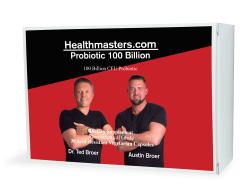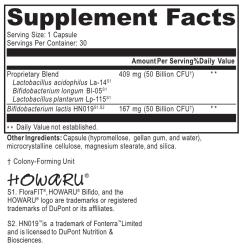Probiotic 100 Billion
Applications for Health Improvement
- Helps maintain a healthy intestinal microbiome
- Supports the natural immune response
- Supports bowel regularity
- Supports lactose digestion
- 100 billion CFUs
30 Acid-Resistant Vegetarian Capsules
Supplementation with probiotics has many mechanisms of action that benefit health, including but not limited to: (1) supporting metabolic activity, such as the production of short-chain fatty acids and vitamins, nutrient absorption, and digestion of lactose; (2) adhering to intestinal epithelial cells to help maintain a healthy balance of organisms in the intestinal tract; (3) helping to establish populations of good bacteria after disruption in balance; (4) supporting immune function; (5) promoting intestinal epithelial cell survival; (6) supporting healthy bowel function; and (7) degrading oxalates [1-7].
Each vegetarian, dairy- and gluten-free capsule contains four-strain probiotic totaling 100 billion CFU† per capsule. To further support resistance to low pH and the delivery of microorganisms to the small intestines, we utilize DRcaps™ gastro-resistant capsules. These specially designed, innovative capsules help slow exposure of actives to stomach acid to promote a more targeted release. Each capsule is sealed in nitrogen-purged aluminum blister packs to serve as protection from factors proven to compromise the stability of probiotics, such as heat, moisture, and oxygen.
Lactobacillus acidophilus (Lactobacillus acidophilus La-14): This common inhabitant of the human mouth, intestinal tract and vagina, is also found in some traditional fermented milks (e.g., kefir). It has a history of safe human consumption. The L. acidophilus La-14 strain is of human origin and has been identified as a type A1 L. acidophilus. L acidophilus shows excellent adhesion to human epithelial cell-lines [8,9].
Bifidobacterium longum (Bifidobacterium longum Bl-05): The B. longum Bl-05 strain is well accepted as safe for human consumption. B. longum is resistant to low pH and bile salts and is well suited to the intestinal environment [10].
Lactobacillus plantarum (Lactobacillus plantarum Lp-115): This strain was isolated from plant material and is abundantly present in lactic acid-fermented foods, such as olives and sauerkraut. In vitro studies have shown that L. plantarum Lp-115 strain has excellent adhesion to epithelial cell lines [12]. In addition, L. plantarum is resistant to low pH conditions and survives the presence of bile at duodenal concentrations [10,11].
Bifidobacterium lactis (Bifidobacterium lactis HN019): Researchers have identified strain HN019 as having excellent probiotic potential based upon its ability to survive the transit through the human gastrointestinal tract, adhere to epithelial cells, and proliferate [5]. In a randomized, double-blind, placebo-controlled human dietary intervention study in elderly subjects (>60 yrs.), supplementary B. lactis HN019 resulted in statistically significant increases in the beneficial organisms bifidobacteria and lactobacilli [12].
References
- Vanderpool C, Yan F, Polk DB. Mechanisms of probiotic action: Implications for therapeutic applications in inflammatory bowel diseases. Inflamm Bowel Dis. 2008 Nov;14(11):1585-96. [PMID: 18623173]
- Abratt VR, Reid SJ. Oxalate-degrading bacteria of the human gut as probiotics in the management of kidney stone disease. Adv Appl Microbiol. 2010;72:63- 87. [PMID: 20602988]
- Masood MI, Qadir MI, Shirazi JH, et al. Beneficial effects of lactic acid bacteria on human beings. Crit Rev Microbiol. 2011 Feb;37(1):91-98. [PMID: 21162695]
- Shu Q, Lin H, Rutherfurd KJ, et al. Dietary Bifidobacterium lactis (HN019) enhances resistance to oral Salmonella typhimurium infection in mice. Microbiol Immunol. 2000;44(4):213-22. [PMID: 10832963]
- Gopal P, et al. Effects of the consumption of Bifidobacterium lactis HN019 (DR10TM) and galacto-oligosaccharides on the microflora of the gastrointestinal tract in human subjects. Nutr. Res. 2003;23:1313-28. http://www. daniscosupplements.com/clinical-study-bibliography.html. Accessed June 24, 2011.
- Danisco. Clinical study bibliography & abstracts. HOWARU Bifido – Bif. lactis HN019. http://www.daniscosupplements.com/clinical-study-bibliography.html. Accessed June 24, 2011.
- Waller PA, Gopal PK, Leyer GJ, et al. Dose-response effect of Bifidobacterium lactis HN019 on whole gut transit time and functional gastrointestinal symptoms in adults. Scand J Gastroenterol. 2011 Sep;46(9):1057-64. [PMID: 21663486]
- Greene JD, Klaenhammer TR. Factors involved in adherence of lactobacilli to human Caco-2 cells. Appl Environ Microbiol. 1994 Dec;60(12):4487-94. [PMID: 7811085]
- Kleeman EG, Klaenhammer TR. Adherence of Lactobacillus species to human fetal intestinal cells. J Dairy Sci. 1982 Nov;65(11):2063-69. [PMID: 7153393].
- Ding WK, Shah NP. Acid, bile, and heat tolerance of free and microencapsulated probiotic bacteria. J Food Sci. 2007 Nov;72(9):M446-50. [PMID: 18034741]
- Collado MC, Meriluoto J, Salminen S. Role of commercial probiotic strains against human pathogen adhesion to intestinal mucus. Lett Appl Microbiol. 2007 Oct;45(4):454-60. [PMID: 17897389]
- Ahmed M, Prasad J, Gill H, et al. Impact of consumption of different levels of Bifidobacterium lactis HN019 on the intestinal microflora of elderly human subjects. J Nutr Health Aging. 2007 Jan-Feb;11(1):26-31. [ 17315077]
SUPPLEMENT FACTS
Serving Size: 1 Capsule
| Amount Per Serving | % Daily Value | |
|---|---|---|
|
HOWARU® Bifido (Bifidobacterium lactis HN019)
|
50 Billion CFU† | ** |
|
Proprietary Blend
Lactobacillus acidophilus La-14 Lactobacillus plantarum Lp-115 Bifidobacterium longum Bl-05 |
50 Billion CFU† | ** |
†Colony-Forming Unit

























